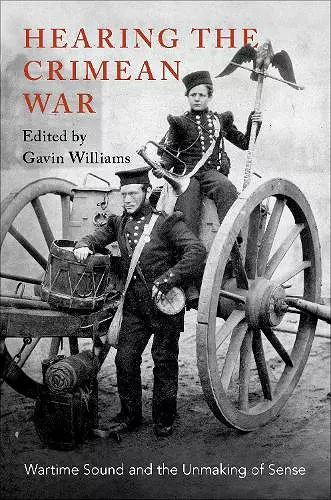Hearing the Crimean War
Wartime Sound and the Unmaking of Sense
Format:Paperback
Publisher:Oxford University Press Inc
Published:21st Feb '19
Currently unavailable, currently targeted to be due back around 29th April 2025, but could change
This paperback is available in another edition too:
- Hardback£120.00(9780190916749)

What does sound, whether preserved or lost, tell us about nineteenth-century wartime? Hearing the Crimean War: Wartime Sound and the Unmaking of Sense pursues this question through the many territories affected by the Crimean War, including Britain, France, Turkey, Russia, Italy, Poland, Latvia, Dagestan, Chechnya, and Crimea. Examining the experience of listeners and the politics of archiving sound, it reveals the close interplay between nineteenth-century geographies of empire and the media through which wartime sounds became audible--or failed to do so. The volume explores the dynamics of sound both in violent encounters on the battlefield and in the experience of listeners far-removed from theaters of war, each essay interrogating the Crimean War's sonic archive in order to address a broad set of issues in musicology, ethnomusicology, literary studies, the history of the senses and sound studies.
This focused collection of essays explores the soundscapes of the Crimean War from an admirably diverse range of disciplinary and geographical perspectives. In doing so, it not only offers an ambitious rethinking of the transnational phenomenon of the Crimean War but also serves as a ground-breaking exemplar for the historical study of aurality. * Panel of the RMA/Cambridge University Press Outstanding Edited Collection Book Prize for 2020 *
[...] throughout this collection, silence and sound, real and imaginary, are not conceived as dichotomies, but phenomena that constantly intertwine. Listening practices and hearing experiences are documented with an ear for how real events are captured while being mediated by their context, and this approach also shows how recorded sounds can silence, and silence can unearth, sonic phenomena and perceptions. * Annelies Andries, University of Oxford, Music and Letters *
[...] the collection attempts to amplify the silences of the archives: what was communicated, recorded, and what has been omitted from history? Where were the notable gaps? Where was media's activity, its non-neutrality, most evident, and how did it shape the war itself in addition to public perception? Sound and silence thus become, far from opposites of one another, two sides of the same coin, both worthy objects of study for the authors of the collection. * Cooper Lynn, Ethnomusicology Review *
Recommended. * J.E. Druesedow Jr., CHOICE *
Hearing the Crimean War offers a crucial contribution not only to historical sound studies, but also to scholarly discourse on sound and affect in wartime. With essays that address the many forms of media in which sound and sense came to be inscribed during the Crimean War-from literature, legal texts, and news articles to opera, popular song, and silence- this book and its authors provide a profoundly interdisciplinary account, impressive it in its historical and methodological scope, of how this global conflict was understood and remembered by those who lived through it." * Dr. Jillian Rogers, Lecturer in Musicology, University College Cork *
This relentlessly brilliant volume, bringing together sound studies scholars, musicologists, ethnomusicologists, literary scholars and cultural historians, will provoke lively, and timely, discussion of musicology's 'sonic turn'. The various soundscapes of the Crimean War take shape - and melt back into air - in these pages, both on and far beyond the battlefield. Williams' chief contention is that the global moment signaled and shaped by the Crimea conflict anticipates and complicates our understanding of those of the present day. This volume will continue to raise questions about them long into the future. * Martin Stokes, King Edward Professor of Music, King's College London *
- Winner of Winner of the RMA/Cambridge University Press Outstanding Edited Collection Book Prize for 2020.
ISBN: 9780190916756
Dimensions: 155mm x 231mm x 20mm
Weight: 454g
328 pages